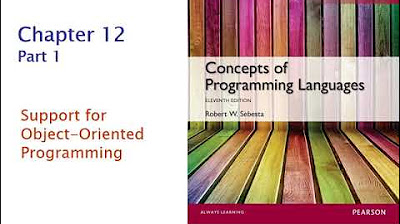KONSEP DASAR PEMROGRAMAN BERORIENTASI OBJEK
Summary
TLDRThis video script delves into the foundational concepts of Object-Oriented Programming (OOP), contrasting it with procedural programming. It introduces the need for OOP through a case study involving shape manipulation and sound effects, highlighting the benefits of OOP such as code reusability, modularity, and ease of maintenance. The script illustrates the differences between procedural and OOP approaches using the examples of Larry's procedural method and Bridge's OOP method, emphasizing OOP's advantages in adaptability and extensibility. It concludes by discussing the tools used in OOP, such as Java, PHP, and C++, and encourages viewers to understand the paradigm shift from procedural to OOP for better program analysis and structure.
Takeaways
- 😀 The video discusses the concept of Object-Oriented Programming (OOP), focusing on its importance and fundamental concepts.
- 🏆 It presents a case study involving a competition between two individuals, Larry and Bridge, who are tasked with creating code for shapes that rotate and play sound when clicked, highlighting the differences between procedural and OOP approaches.
- 🔍 Larry uses a procedural approach, focusing on writing specific procedures for each action like rotation and sound playback, which might become cumbersome with changes in requirements.
- 💡 Bridge adopts an OOP approach by creating classes for each shape, encapsulating properties and methods, making the code more structured and easier to manage when new requirements emerge.
- 📚 The video emphasizes the benefits of OOP, such as better organization, reusability of code, modularity, and ease of understanding and maintaining the code.
- 🔄 The flexibility and extensibility of OOP are highlighted, as it allows for adding new features or shapes without major changes to the existing codebase.
- 🛠️ The video mentions tools used in OOP, such as Java, PHP, and C++, indicating that most modern programming languages support OOP concepts.
- 🤔 It poses a question to the viewers about which approach, procedural or OOP, is more advantageous, suggesting that OOP provides a clear path for complex and large-scale projects.
- 🧩 The concept of 'modularity' in OOP is explained, where functions and data are bundled into classes, making it easier to identify and manage components of the program.
- 🔑 The video touches on the key features of OOP, including encapsulation, inheritance, and message passing, which are essential for solving domain problems.
- 🌐 The transcript concludes with an invitation for viewers to ask questions on e-learning platforms or group chats, emphasizing the importance of understanding OOP concepts.
Q & A
What is the main topic discussed in the video script?
-The main topic discussed in the video script is the concept of object-oriented programming (OOP), including its benefits, differences from procedural programming, and its application in software development.
What are the four key points covered in the video script regarding OOP?
-The four key points covered are: 1) The need for OOP, 2) The difference between procedural and OOP, 3) The concept of an object-oriented system, and 4) The tools used in OOP.
What is the example given to illustrate the use of OOP in the video script?
-The example given is a GUI with shapes like square, circle, and triangle that rotate 360 degrees and play sound files when clicked, demonstrating the use of classes and objects in OOP.
Who are Larry and Bridge, and what programming approaches do they represent?
-Larry and Bridge are characters in the script representing two different programming approaches. Larry represents procedural programming, while Bridge represents object-oriented programming.
What is the advantage of OOP demonstrated by Bridge's approach in the script?
-Bridge's approach using OOP allows for more flexibility and extensibility. When new requirements come in, such as adding an 'Ameba' shape, Bridge can simply create a new class without modifying existing code, unlike Larry who has to alter his procedural code.
What is the significance of the 'Ameba' example in the script?
-The 'Ameba' example illustrates how OOP can easily accommodate changes in requirements. When the requirement to add an 'Ameba' shape comes up, it can be implemented as a new class without affecting the existing codebase, showcasing the adaptability of OOP.
What are the benefits of OOP mentioned in the video script?
-The benefits of OOP mentioned include better organization and structuring of code, reusability of code for similar projects, modularity, ease of understanding and debugging, and improved efficiency in developing complex and large-scale programs.
How does the video script differentiate between procedural programming and OOP?
-The script differentiates by explaining that procedural programming focuses on a sequence of instructions and functions to manipulate data, whereas OOP focuses on objects that encapsulate both data and functions, working together to solve problems.
What is the role of 'inheritance' in OOP as discussed in the video script?
-Inheritance in OOP allows new classes to derive properties and behaviors from existing classes, which helps in solving domain problems more efficiently by reusing and extending existing code.
Which programming languages are mentioned in the script as supporting OOP?
-The script mentions Java and PHP as examples of programming languages that support OOP. It also implies that almost all modern programming languages now support OOP.
How does the video script conclude the comparison between procedural programming and OOP?
-The script concludes by summarizing the advantages of OOP, such as better organization, reusability, modularity, and ease of maintenance, especially in the context of changing project specifications.
Outlines

Cette section est réservée aux utilisateurs payants. Améliorez votre compte pour accéder à cette section.
Améliorer maintenantMindmap

Cette section est réservée aux utilisateurs payants. Améliorez votre compte pour accéder à cette section.
Améliorer maintenantKeywords

Cette section est réservée aux utilisateurs payants. Améliorez votre compte pour accéder à cette section.
Améliorer maintenantHighlights

Cette section est réservée aux utilisateurs payants. Améliorez votre compte pour accéder à cette section.
Améliorer maintenantTranscripts

Cette section est réservée aux utilisateurs payants. Améliorez votre compte pour accéder à cette section.
Améliorer maintenantVoir Plus de Vidéos Connexes
5.0 / 5 (0 votes)






